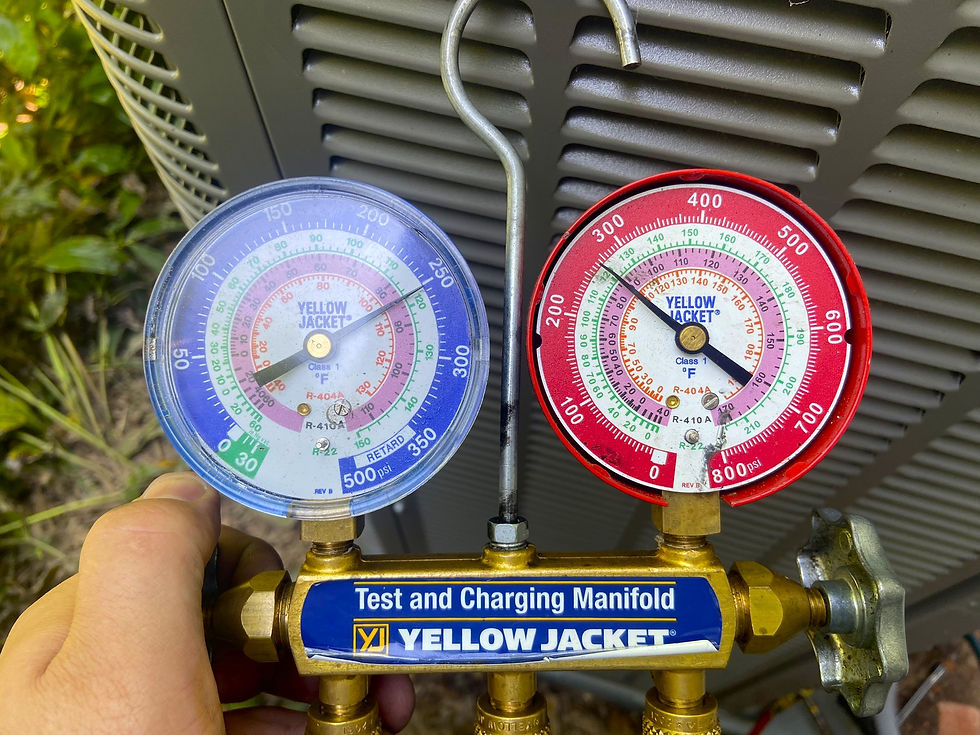UNDERSTANDING HVAC AIR FILTERS
- Arianne Large

- Jun 3, 2020
- 2 min read
Updated: Aug 31, 2021
Did you know that a dirty filter is the #1 reason for HVAC failure? If you want to ensure your heating and air conditioning system is functioning at its optimal capacity, one of the easiest steps you can take is regularly changing your filters.
An air filter’s primary role is to protect the system’s equipment. Without the air filter, all of the dust, dirt, dander, and other particles would pass through to your blower motor, evaporator coil, etc. and cause potential damage to the components within your system.
HOW OFTEN TO REPLACE YOUR FILTERS
Your filters should be replaced every 1 to 3 months based on your system usage and factors related to your household (pets, filter type used, household size, etc.). It is smart to check your filter monthly to see if it may need changing sooner. If the filter’s surface is gray and covered in buildup, change it.

PROBLEMS CAUSED BY NOT CHANGING YOUR HVAC FILTERS
OVERHEATING OR BREAKDOWN - The system would be overworked causing it to overheat and damage components
ENERGY WASTE - The system would have to work harder to force air through dirty filters, using more energy and increasing your expenses
LOSS OF EFFICIENCY - Comfort would be sacrificed as system efficiency decreases
POOR AIR QUALITY - More allergens and contaminant particles in the home, increased allergy symptoms, and dirtier surfaces
HOW TO FIND YOUR FILTER SIZE
Air filters come in a variety of sizes and your heating and cooling system needs the proper size to operate correctly. To find the size of your system’s filter, slide the old filter out of the filter cabinet. Most filters have the dimensions printed on their frame in L x W x H format.
WHAT KIND OF FILTER SHOULD I USE?
As air moves through your home’s HVAC system, air filters trap and collect large and small particles such as dust, allergens, and microorganisms. Furnace filters range in efficiency, using a Minimum Efficiency Reporting Value (MERV) rating of 1 to 20. This rating measures how effectively the filter stops dust, allergens, and other contaminants from passing through the filter and into the air stream.
Filters with a lower MERV rating are the best option when budget is a concern and health issues are minimal. When selecting the right filter for your home, higher is not always better. Using an air filter with a MERV rating higher than what your furnace or air conditioner manufacturer recommends can impair its performance.
RESIDENTIAL HVAC MERV RATINGS

HOW TO REPLACE YOUR HVAC AIR FILTER
To replace your filter, follow these easy steps. It only takes a few minutes.
1. Locate the filter – in return grill in the wall or ceiling or at your furnace
2. Remove the filter door or grill cover
3. Remove the old filter and dispose of it
4. Unwrap your new filter, dispose of packaging, and slide it into the filter compartment according to the printed arrows on the frame that indicate direction of airflow
5. Replace the filter compartment door or filter grill cover.

If you need help locating, replacing, or choosing the air filter for your heating and air conditioning, call Helms Heating & Air Conditioning! We are your year round comfort source since 1979!



